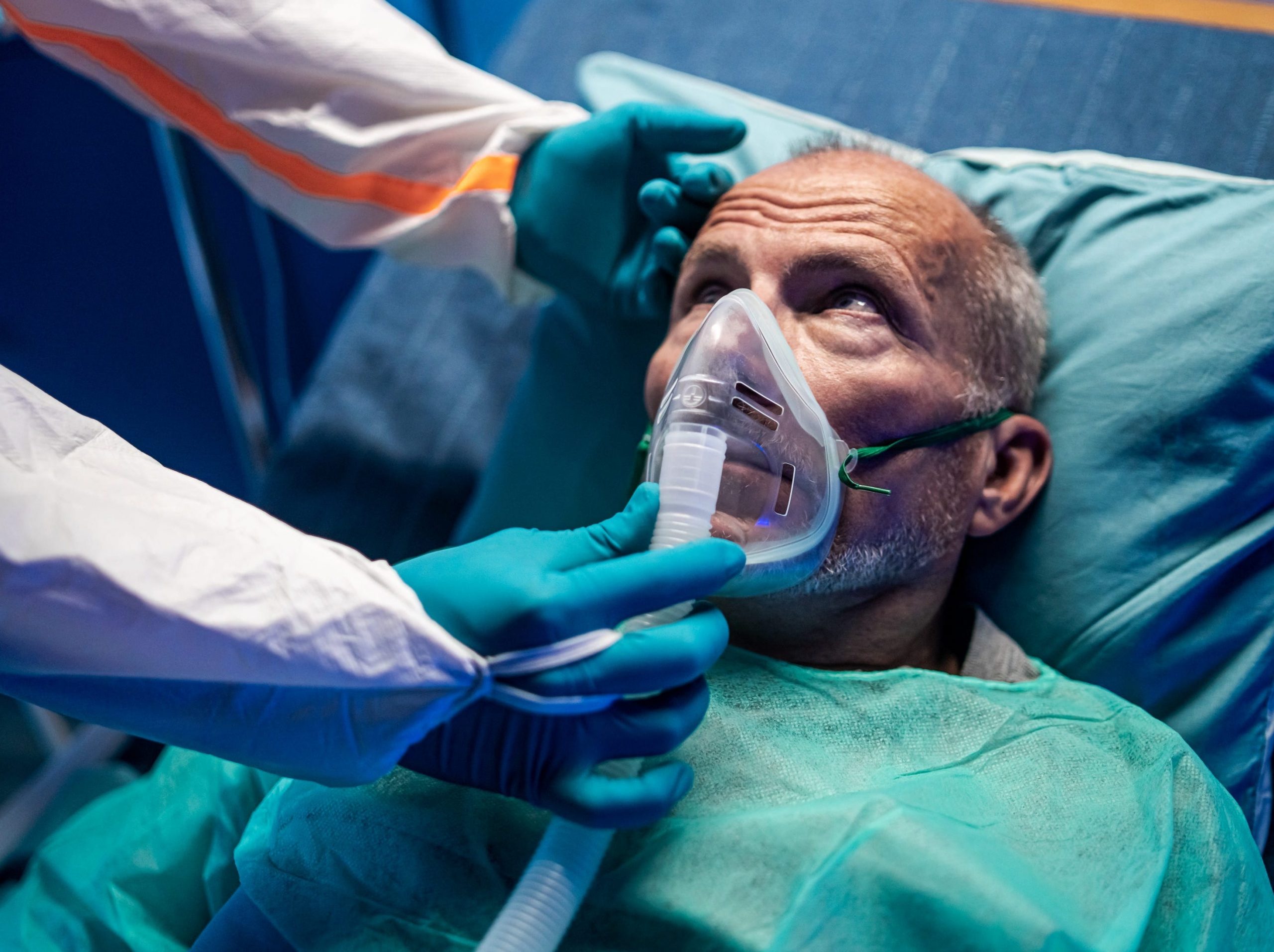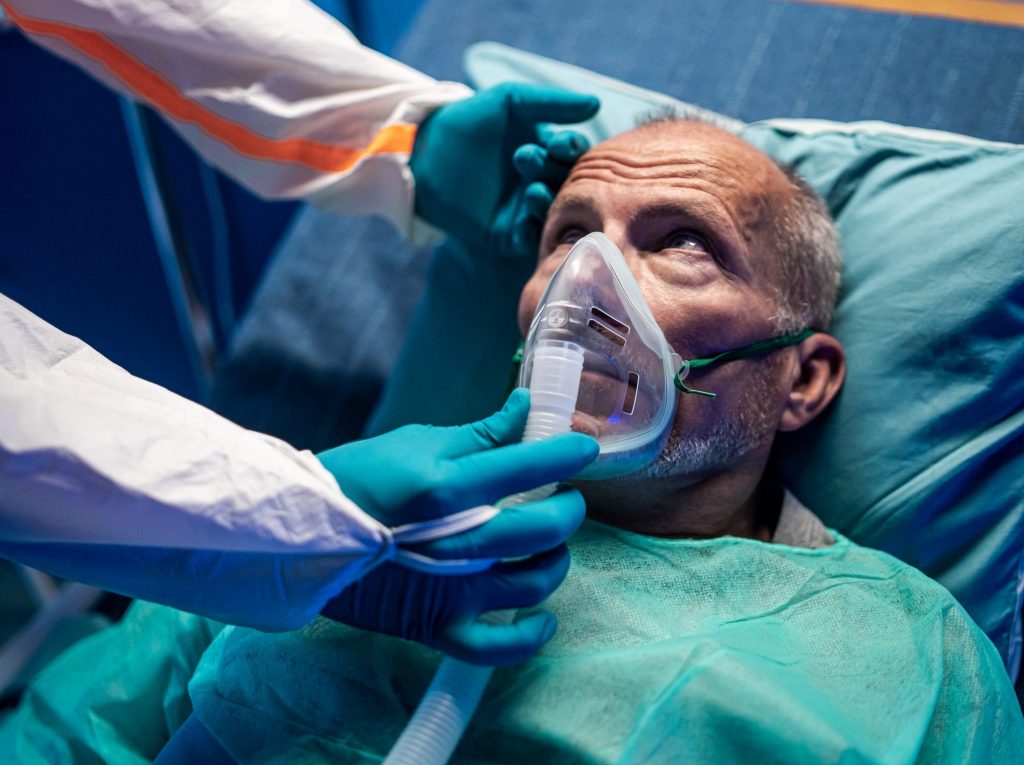
Halfpoint Images/Getty Images
- Florida is experiencing its most devastating COVID-19 surge yet, fueled by the Delta variant.
- Hospitals are being stretched to the brink once again, with mounting wait times and limited oxygen.
- More than a year on, doctors and medical workers told Insider about the toll this fight is exacting.
- See more stories on Insider's business page.
Ed Jimenez was walking down the hall of the University of Florida Health Shands Hospital recently when he ran into a nurse on staff.
The unrelenting pandemic has made it hard at times for Jimenez – CEO of the teaching hospital in Gainesville which counts more than 1,000 beds – to sustain morale among his workforce.
"Everybody I talked to was putting up a wonderful exterior: 'We got this. We're helping people,'" he recounted in an interview this week with Insider.
Still, he could see the anguish behind their eyes. The nurse reminded him of what has become one of the pandemic's most sobering scenes.
"When we're on that path to where somebody's not going to make it, we go get the family, so at least they can say goodbye through the glass window," she told him.
An explosion in the virus' highly-transmissible Delta variant has mired the state in its most vicious fight with the disease in recent weeks. Florida has become the epicenter of a new wave of infections in the US, and its vaccination rate is far short of states like Connecticut and New York.
On Saturday, nearly 24,000 new COVID-19 cases were reported in Florida, the Centers for Disease Control and Prevention said, marking an all-time one-day high for the state. An additional 93 people died, and more than 13,000 people were hospitalized.
For comparison, the state reported just 1,250 new infections on June 1.
A spokesperson for the UF Health Shands Hospital told Insider that, as of Saturday, the facility had admitted 204 COVID-19 patients. Forty-four were receiving ICU treatment.
Baptist Health, a system of 11 hospitals, counted 810 COVID-19 patients as of Friday, a representative confirmed, which is a 97% increase from two weeks ago.
Intensive care units in Florida are filling up, and final moments with loved ones, separated by face shields and glass barriers, have become a resurgent reality.
'You just emotionally break'
Insider interviewed seven doctors, hospital leaders, and local government officials, to understand how they're responding to the situation.
Steve Kessel, a South Florida cardiologist at Palm Beach Medical Center and Jupiter Medical Center, said that some frontline doctors have found themselves burning precious time quibbling with sick patients who are still adamant that they were right to forego the vaccine. It's producing exasperation and even anger among medical providers, he said.
At one South Florida hospital, some COVID patients have had to wait in the triage area for up to a day since no ICU beds were immediately available, said a doctor in the area who requested not to be identified as they were unauthorized to speak to the media.
Jimenez of the UF Health Shands Hospital in Gainesville focused on another growing sentiment among some doctors and nurses: depletion.
"Humanly, you break at some point," Jimenez said. "You just emotionally break."
'If you lose that bet, you could die'
About half of adults in Florida (50.8%) are fully vaccinated, according to data from Johns Hopkins University. The Delta variant is preying upon the roughly half of adults in the state who aren't.
"It's certainly been frustrating to know that we have really excellent preventative measures at this point. We're so lucky to have a vaccine," said David Wein, chief of emergency medicine at Tampa General Hospital. "That adds, perhaps, to some of the frustration - that it's just not being accessed and utilized to its fullest."
Jimenez said he's heard of some patients pleading to be vaccinated after they've fallen ill. "The saddest ones obviously are the ones that are in the ICU," he said. "It's clearly way too late."
Paul Schwartz, a South Florida physician, has detected something else: continued defiance among some about the severity of the illness.
A recent conversation with a venture-capitalist friend left him especially puzzled. The investor was bullish that "his odds of acquiring COVID are relatively small, and of dying of COVID are infinitesimally small," Schwartz said.
"My comment to him was: 'That's an all-in bet,'" the physician added. "If you lose that bet, you could die."
High numbers of patients are creating backlogs
With the number of COVID patients skyrocketing, it's not just emergency medical systems which are being taxed, said Barry Burton, the county administrator who leads local government operations for Pinellas County, which counts nearly 1 million residents on the state's west coast.
The situation "has taxed our healthcare system, our emergency rooms, our ambulances, and our fire rescue, because it all works as a system," he told Insider.
The county's ambulance system used to be able to do a patient transfer to a hospital in about 15 minutes.
But backups at county hospitals are forcing patients to sit, waiting in ambulances, for hour-long stretches or more when they arrive, Burton said, taking those emergency units out of commission. New patients have to wait longer at home to be picked up, or the fire department has to pitch in to run transfers.
Meanwhile, hospitals are confronting a nationwide shortage of nurses.
Kevin Taylor, the emergency room director at Baptist Health's two Bethesda Hospital locations in Boynton Beach, said that nurses on staff are making up for the lack in reinforcements by volunteering for extra shifts.
"You do worry about the strain, and there is fatigue," he said.
Overwhelmed hospitals have begun diverting patients elsewhere
Jimenez of the UF Health Shands Hospital told Insider that his hospital has rescheduled some elective surgeries until next week to ensure that enough ICU beds remain available.
He said that Putnam Community Medical Center, a 99-bed medical facility in the city of Palatka, had to divert some patients to the nearby North Florida Regional Medical Center, which has 523 beds, last week in order to deal with a patient overload.
Both hospitals are located in Alachua County in northern Florida. Like the rest of the state, Alachua County has experienced a sharp upswing in cases since the early summer. Its vaccination rate, while not quite stalled, has gone from just 56% in mid-June to 61% by early August.
A spokesperson for HCA North Florida, which counts both hospitals as affiliates, told Insider in an email that Putnam Community Medical Center's oxygen capacity tool last week warned that it was approaching its upper threshold "for a limited amount of time."
The hospital implemented "proactive measures" - including diverting patients to larger facilities - to reduce strain on the oxygen systems, the spokesperson said.
Even more difficult times could lie ahead
As ominous as the situation appears now, some Florida doctors worry it could escalate, particularly with schools reopening in the coming week.
Florida governor Ron DeSantis, a Republican, previously issued an executive order prohibiting masks from being worn in the classroom. But on Saturday, Mike Burke, the superintendent of Palm Beach County public schools, told families in a letter that he would require them nonetheless, unless parents specifically opt their child out.
Facial coverings may not be enough to prevent future coronavirus mutations that could thwart vaccines - a scenario that Rochelle Walensky, director of the CDC, warned about last month. Such a scenario could push already strained hospitals over the edge.
Ultimately, Floridians themselves will be the arbiters of what happens next, Kessel said.
He lamented that misinformation about vaccines was partly responsible for upending the state's public health efforts, likening dangerous urban legends to "superstitions."
"If we were still believing in superstitions," he said, "we'd still be using leeches and witch doctors to cure people."











